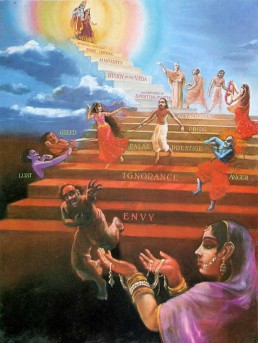Having thus served with different samples the seekers of the average intelligence and the dullest in this stanza the Lord is trying to indicate the Eternal Self to the MOST INTELLIGENT students, who have the capacity to do subtle reflection upon such philosophical ideologies.
I AM THE STRENGTH IN THE STRONG — This statement is evidently as easy of comprehension as the example given in the previous stanza. But the statement out-shines the above set of examples when here, Krishna gives the phrase qualifying “Balam.” Generally, an individual expresses his might and strength only when he is goaded by his desires or attachments.
Without these two inner urges it is impossible for us to see any expression of might or strength. Desire (Kama) and attachment (Raga) are generally considered by students of Vedic literature as almost synonyms; but Shankara, in his commentary, has very thoughtfully given us the distinction between these two powerful impulses. He says Kama is ‘desire for what is absent’ at present in the scheme of our life, and Raga is ‘affection for what one already has.’ These are the two emotions, lashed by which, individuals or communities, or societies or nations, generally express their might and strength (Balam). Riots and agitations, battles and wars, are all ever motivated by these two dangerous urges. In the subtle definition of the Self, the Lord brings a new life of thought here for the contemplation of the seeker. He says, the Self is not merely the strength in the strong but “I AM THE STRENGTH DEVOID OF DESIRE AND ATTACHMENT.”
As though not satisfied with his own definition, the Lord gives yet another example. “I AM DESIRE IN BEINGS, UNOPPOSED TO DHARMA.” We have already explained the term Dharma as the ‘LAW OF BEING.’ The essential factor in man is the Divine Consciousness. All actions, thoughts and ideas entertained by him which are not opposed to his essential Divine Nature constitute his Dharma. All actions and thoughts that hasten the evolution of man to rediscover his essential Divine Nature are considered righteous action (Dharma), while all activities of the mind and intellect that take him away from his true Divine Nature and make him behave like an animal and degrade him in his evolutionary status, are called unrighteous behaviour (A-dharma).
With this understanding of the term Dharma, the second line of the stanza becomes very clear. “ALL DESIRES THAT ARE NOT UNRIGHTEOUS FOR THE BEINGS,” therefore means the glorious urge in the EVOLVERS to meet their own inner weaknesses courageously and bring out a complete consummation of their evolutionary urge to seek and to discover the goal of Self-perfection. This is the subtle power that is indicated here. The Lord says: ‘I am not the Sadhaka, but I am the burning aspiration in him, to discover and become one with the Immutable Self.’
BY THE ABOVE EXAMPLES, DOES IT MEAN THAT THE SPIRIT HAS BEEN REALLY CAPTURED AND JAILED IN BY MATTER? HOW CAN THE LIMITED LIMIT THE UNLIMITED? LISTEN:

